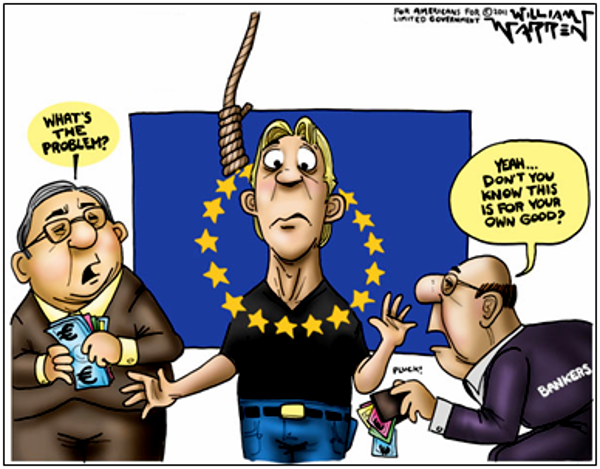Voters in the UK may be ready to leave the European Union (EU), a new poll conducted by ICM from April 8 through April 10 finds, with 45 percent favoring what has been dubbed a “Brexit.”
So, naturally, days later the Bank of England has issued a fresh warning that such a move by Britain would threaten the economy.
“Such a vote might result in an extended period of uncertainty about the economic outlook, including about the prospects for export growth. This uncertainty would be likely to push down on demand in the short run,” the central bank said in an unusual statement on the pending referendum.
The statement continued, “Uncertainty regarding the supply side of the economy might also increase, reflecting any alterations to product or labour market regulation, adjustments in labour flows or changes in the rate of technology adoption as a result of different arrangements governing foreign trade and capital flows. A vote to leave could have significant implications for asset prices, in particular the exchange rate.”
Here the Bank of England is simply attempting to scare voters, threatening a recession or worse if the voters reassert British sovereignty and leave the EU.
But all they’re really doing is creating threatening headlines.
This is actually a pattern among financial institutions, which regularly issue warnings any time voters or legislatures might democratically express their sovereignty in a meaningful way, for example, by telling globalist concerns such as the EU to go take a hike.
One need not look far for other examples.
Numerous warnings were issued by banks and credit rating agencies should Greece leave the Eurozone. It would touch of a financial crisis, lead to a breakup of the currency bloc and touch off a stream of defaults by bondholders.
Same if the European Central Bank did not intervene and buy Italian and Spanish bonds.
Similar warnings were issued in the U.S. in 2011 when Congress briefly considered conditioning an increase in the national debt ceiling on a balanced budget amendment to the U.S. Constitution. Not raising the debt ceiling — and borrowing trillions of more dollars — would threaten a financial crisis and trigger a recession, the banks said.
And who can forget 2008 when the issue of bank bailouts came up? If Congress did not vote to bail out banks that bet poorly on U.S. housing, it would trigger a depression worse than the Great Depression. So the banks got hundreds of billions of dollars from Congress, and then hundreds of billions more from the Federal Reserve, which created money to buy back worthless mortgage-backed securities.
Even puny little Iceland was threatened when bailing out the failed Icesave bank came up, and foreign investors were going to lose some money. They were threatened with credit downgrades and the like.
If the global trade agenda is not advanced by adopting the 12-nation Trans-Pacific Partnership — the largest trade agreement ever —why it will be Smoot-Hawley all over again, tariffs galore and a return to the worst days of the Great Depression.
See a pattern? The most well-connected, powerful institutions in the world regularly use fear to great effect to move sovereign legislatures and peoples to vote and act against their own interests — by threatening retaliation, reprisal and recession.
With the exception of Iceland — which rejected a referendum in 2011 to bail out foreigners who invested in Icesave — none have dared defy these forces. Why?
Nothing really bad happened there. In fact, in Iceland, which did not bail out its banks, the recession was shallower and unemployment dropped faster than other European countries, where the banks were bailed out.
All they do is issue hollow threats, that everything will kick start the global financial crisis once again. The peoples of Western democracies are not allowed to do anything in their national interests.
Take Britain. Thanks the EU open borders immigrations policies, the UK has lost control of its own borders while Europe attempts to absorb the mass migration fleeing the war in the Middle East.
Try to do something about it, like leave the EU, and it’s the end of the world. Give me a break.
When are people going to wake up and stop letting these international financial institutions use fear to control democratic outcomes? Say no for once, it will do you some good.
Robert Romano is the senior editor of Americans for Limited Government.







